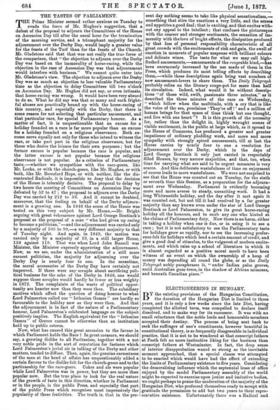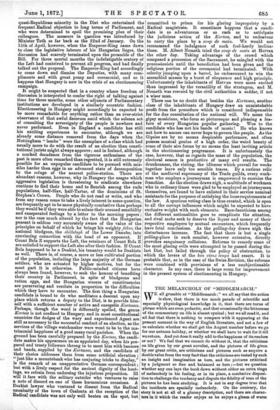ELECTIONEERING IN HUNGARY.
BY the existing provisions of the Hungarian Constitution, the duration of the Hungarian Diet is limited to three years, and it is only a few weeks since the late Diet, having completed the allotted term, was compelled to declare itself dissolved, and to make way for its successor. It was with no small reluctance that the noble lords and honourable members accepted their destiny. The process of being sent back to seek the suffrages of one's constituents, however beautiful in constitutional theory, is so frequently disagreeable in individual practice, that it is not to be wondered at that conscript fathers at Perth felt no more instinctive liking for the business than conscript fathers at Westminster. In fact, the deep sense of interior disapprobation waxed so strong as the inevitable moment approached, that a special clause was attempted to be enacted which would have had the effect of extending the limits of Parliamentary existence to five years. Considering the demoralising influence which the septennial lease of office enjoyed by the model Parliamentary assembly of the world might be expected to exercise upon junior and imitative bodies, we ought perhaps to praise the moderation of the majority of the Hungarian Diet, who professed themselves ready to accept with gratitude the permission to add but two years to their repre- sentative existence. Unfortunately there was a Radical and
quasi-Republican minority in the Diet who entertained the frequent Radical objection to long terms of Parliament, and who were determined to spoil the promising plan of their colleagues. The measure in pestion was introduced by Minister Toth as far back as the 22nd of January. On the 15th of April, however, when the Emperor-King came down to close the legislative labours of his Hungarian lieges, the discussion had scarcely terminated upon the preamble of the Bill. For three mortal months the indefatigable oratory of the Left had contrived to prevent all progress, and had finally talked out the proposal. The Emperor-King had accordingly to come down and dismiss the Deputies, with many com- pliments and with great pomp and ceremonial, and so it happens that Hungary is now in the crisis of an electioneering campaign.
It might be suspected that in a country where freedom of discussion is interpreted to confer the right of talking against time for three months, some other adjuncts of Parliamentary institutions are developed in a similarly eccentric fashion. Electioneering in Hungary might accordingly be expected to be more remarkable for anything rather than an over-strict observance of that awful decorum amid which the solemn act of consulting the sovereignty of the people is nowhere and never performed. Even in England a candidate has still his exciting experiences to encounter, although we are already some distance removed from the days when the Nottingham "lambs" were the exemplars of a class which had usually more to do with the result of an election than consti- tutional jurists might always approve; and in Ireland, although a marked decadence from the vigorous enthusiasm of the past is more often remarked than regretted, it is still extremely possible for an unpopular candidate to be pursued with mis- siles harder than eggs in an advanced state of decomposition to the refuge of the nearest police-station. There are abundant reasons, however, why in Hungary the usages which aggressive legislation is threatening to eradicate elsewhere continue to find their home and to flourish among the rude populations, half-Slav, half-Tartar, of the dominions of St. Stephen's Crown. People who do not read or write, and who from any reason come to take a lively interest in some question, are frequently apt to be more physically combative than perhaps they would be if they were able to solace their aroused sensibility and exasperated feelings by a letter to the morning papers ; nor is the case much altered by the fact that the Hungarian peasant is seldom very accurately aware of the value of the principles on behalf of which he brings his weighty fokog, the national bludgeon, the shillelagh of the Lower Danube, into convincing connection with the head of an opponent. If Count Bela Z supports the Left, the retainers of Count Bela Z are satisfied to support the Left also after their fashion. If Count Bela happened to be a Deakist, his tenantry would be Deakists as well. There is, of course, a more or less cultivated portion of the population, including the large majority of the German settlers, who are actuated by higher motives, but for the most part it is otherwise. Public-minded citizens have always been found, however, to seek the honour of benefiting their country in Parliament, in spite of bludgeons and rotten eggs, and the Hungarian wooers of constituencies are persevering and resolute in proportion to the difficulties which they have to encounter. The first thing a Hungarian candidate is bound to do who meditates a descent upon any place which returns a deputy to the Diet, is to provide him- self with a sufficient number of active and energetic Kortesses. Perhaps, though the word is differently spelled, the genus Kortess is not confined to Hungary, and in most constitutional countries the dodges of the wary and experienced Agent are still as necessary to the successful conduct of an election, as the services of the village watchmaker were wont to be to the ma- trimonial happiness of a good many rural parishes. When the ground has been carefully prepared by the Kortess, the candi- date makes his appearance on an appointed day, when his pre- pared and trusty followers throng in to meet him with banners and bands, supplied by the Kortesses, and the candidate of their choice addresses them from some artificial elevation ; "just like a mountebank who has conjuring tricks to display," ur the remark of an unappreciative German correspondent ; but with a lively respect for the ancient dignity of the hust- ings, we refrain from endorsing the injurious proposition. Ill will it fare with the solitary outsider who ventures to raise a note of discord on one of these harmonious occasions. A Deakist lawyer who ventured to dissent from the Radical unanimity of the town of Czalonta at the reception of the Radical candidate was not only well beaten on the spot, but committed to prison for his glaring impropriety by a Radical magistrate. It sometimes happens that a candi- date is so adventurous or so rash as to anticipate the judicious action of the Kortess, and to endeavour ' to carry the place by a coup de main. We would not recommend the indulgence of such fool-hardy inclina- tions. M. Albert Nemeth tried the coup de main at Hatvan the other day. Taking advantage of the crowd which composed a procession of the Sacrament, he mingled with the processionists until the benediction had been given and the religious portion of the ceremonial had terminated. With celerity jumping upon a barrel, he endeavoured to win the assembled masses by a burst of eloquence and high principle. Unfortunately the inhabitants of Hatv an were more excited than impressed by the versatility of the stratagem, and M. Nemeth was rescued by the civil authorities a sadder, if not a wiser man.
There can be no doubt that besides the Kortesses, another class of the inhabitants of Hungary draw an unmistakable profit from the procedure which is considered indispensable for the due consultation of the national will. We mean the gipsy musicians, who form so picturesque and pleasing a fea- ture of every Hungarian popular gathering. Woe to the candidate who has not his bands of music He who knows not how to amuse can never hope to govern the people. As the Gipsies are by no means despicable performers, and often possess musical genius of a high order, the weird beauty of some of their airs forms by no means the least inviting article in the electioneering programme. It is unfortunately the case, however, that as regards the mass of the population, the electoral season is productive of many evil results. The drunkenness, the rioting, the idleness which prevail for weeks together leave only too sensible traces. By a curious relic of the mediaaval supremacy of the Trade guilds, every work- man who employs a journeyman is empowered to exercise the franchise. As the election draws nigh, a multitude of workmen who in ordinary times were glad to be employed as journeymen themselves, are found to have enlisted in their service nominal assistants for the purposes of satisfying the looserequirements of the law. A spurious voting class is thus created, which is open to all the corrupt influences which might be expected to have exclusive weight with such elements. Race-fanaticism among the different nationalities goes to complicate the situation, and rival mobs seek to deserve the liquor and money of their respective employers by mutual encounters, which frequently have fatal conclusions. As the polling-day draws nigh the disturbances increase. The fact that there is but a single polling-place in each comitat, however extensive, directly provokes sanguinary collisions. Reforms to remedy some of the most glaring evils were attempted to be passed during the last Diet, but failed through the policy of obstruction, to
which the lovers of the bon vieux temps had resort. It is probable that, as in the case of the Swiss Revision, the reforms were combined with provisions of a less unobjectionable character. In any case, there is large room for improvement in the present system of electioneering in Hungary.



































 Previous page
Previous page